Venezuela: The country that has lost three million people
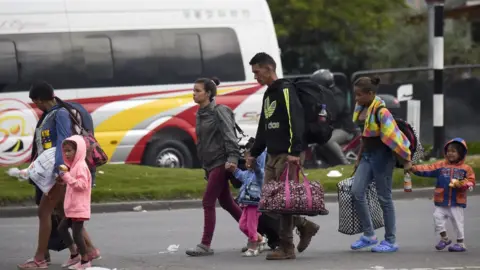 Getty Images
Getty ImagesIn Venezuela, the discussion about how long to stay, or where to flee and how to begin a new life, is never far from many people's minds. Every time I visit the country, there are fewer friends and contacts to catch up with.
An estimated 5,000 people pack up their lives and leave every day, eager to flee the economic collapse and humanitarian crisis which has beset the oil-rich nation.
More than 3m people have fled Venezuela in recent years. According to the UN, that number is expected to rise to more than 5m by the end of 2019,
The vast majority of Venezuelans travel to other parts of South America. More than a million Venezuelans have chosen neighbouring Colombia as their new home, with half a million more travelling through it on their way further south to Ecuador, Peru and the countries beyond.
The lucky ones, those with connections, family members already established and an education, have found work in other parts. But I've also met plenty of former professionals selling water or food on the streets of Peru and Colombia to make ends meet.

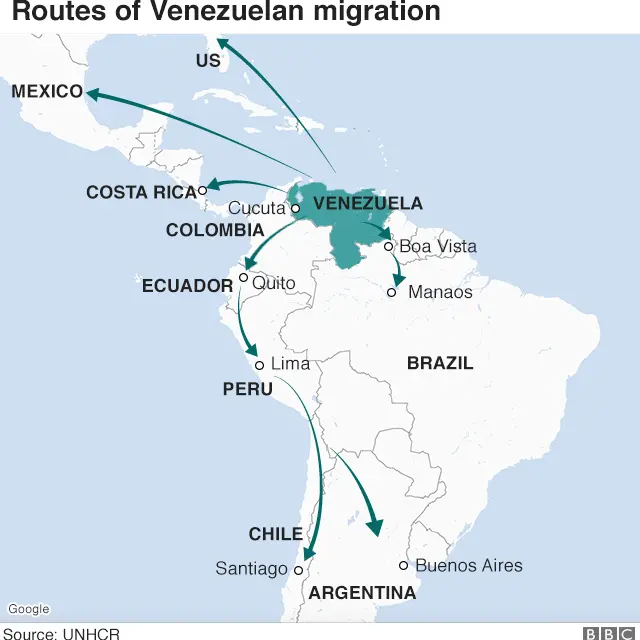

"We are talking about people who are leaving not because of a natural disaster, not because of a war," says Claudia Vargas Ribas, a migration expert at the Simón Bolívar University in Caracas.
New year, new challenges
The new year is widely expected to heap pressure on the Venezuelan government. On 10 January, Nicolás Maduro will be formally sworn in for another six years after being declared the winner in elections last May. These elections were largely boycotted by the opposition and were widely condemned by the US, the EU and most of Venezuela's neighbours.
President Maduro blames "imperialists" - the likes of the US and Europe - for waging "economic war" against Venezuela and imposing sanctions on many members of his government.
But his critics say it is economic mismanagement - first by his predecessor Hugo Chávez and now President Maduro himself - that has brought Venezuela to its knees.
"We are going to have critical days and weeks beginning in January," says David Smolanksy, an exiled opposition leader and now the head of the Working Group on Venezuelan migration for the Organisation of American States.
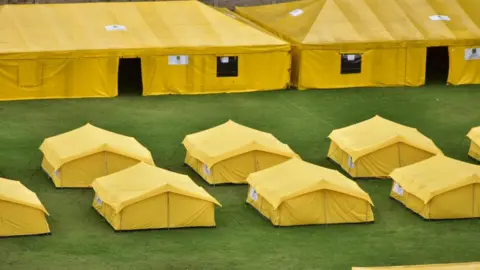 Getty Images
Getty ImagesThe leadership of the opposition-controlled National Assembly changes in early January and some believe this could be the cause of further tension.
"Maduro is going to want to project a show of strength," says Geoff Ramsey, the assistant director of the Venezuela Programme at the Washington Office on Latin America (WOLA).
"I think that's going to create a new level of dissatisfaction and the few that don't have an escape plan will be activating them after Maduro officially takes his new term."
The region reacts
Venezuela's crisis will continue to affect all of South America.
"The countries in the region are developing countries, we can't forget that," says Claudia Vargas Ribas. "So receiving this quantity of people has made their internal affairs more complicated."
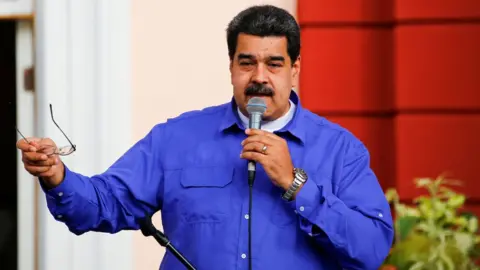 Reuters
ReutersThere have been efforts to co-ordinate the humanitarian response. There have been two meetings in Ecuador's capital Quito and a recognition that countries need to work together to solve the crisis. A third is scheduled for the first half of 2019.
"If you compare what Latin America has done with what Europe has done [with its migrants] - Europe which has better conditions and is more economically developed - the example that Latin America is showing is enormous," says sociologist Tomás Páez, who co-ordinates the Global Project of the Venezuelan Diaspora.
But with more and more Venezuelans arriving, could countries tighten their immigration rules?
"If they put brakes on it, what will grow is irregularity," says Mr Páez, adding that drug-trafficking, prostitution and illegal industries will grow.
More to be done
Some experts believe what's been promised so far is a drop in the bucket compared to what is needed.
"Regional governments are very interested in getting funding from the US and other donors" says Geoff Ramsey. "But they are much more apprehensive when it comes to providing mid- and long-term solutions to the crisis."
Earlier this month, 95 organisations, co-ordinated by the UN Refugee Agency - the UNHCR - and the International Organization for Migration, launched the so-called Regional Response Plan for Refugees and Migrants from Venezuela.
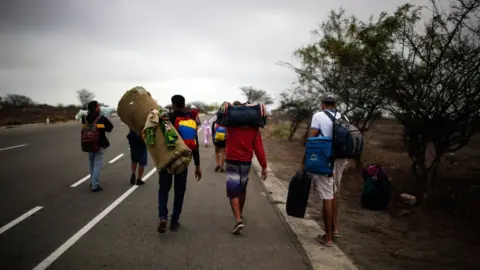 Getty Images
Getty ImagesThe idea is to help respond to needs of those Venezuelans who are migrating as well as call on the international community to help fund aid efforts.
Geoff Ramsey says it is a great start but promises on paper are not enough.
"A meaningful solution to Venezuela's displacement crisis will require Latin America to integrate these communities into their formal economies and job markets."
The region doesn't just need to respond to the crisis, it needs to keep up the pressure against Mr Maduro too, says David Smolanksy.
"You need the strong arm and the friendly hand," he says.
"The region needs to be firm against the dictatorship - as long as it continues, people are going to flee."
